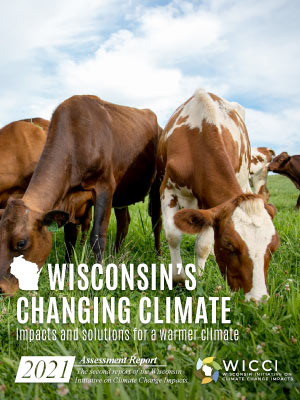 The Wisconsin Initiative on Climate Change Impacts (WICCI), a nationally recognized collaboration of scientists and stakeholders working together to help Wisconsin policymakers and citizens understand the impacts of climate change, has released an assessment report that outlines the latest climate impacts and solutions.
The Wisconsin Initiative on Climate Change Impacts (WICCI), a nationally recognized collaboration of scientists and stakeholders working together to help Wisconsin policymakers and citizens understand the impacts of climate change, has released an assessment report that outlines the latest climate impacts and solutions.
Led by the UW-Madison Nelson Institute for Environmental Studies and the Wisconsin Department of Natural Resources (DNR), WICCI has been a resource on climate change, providing information and research to the Governor’s Task Force on Climate Change and publishing a previous assessment report in 2011. This latest report follows-up on the 2011 report, showcasing how the climate has continued to change over the past decade and how new data and insight is leading to adaptation, mitigation, and solutions. The report is the product of 14 working groups that include over 200 scientists, practitioners, and Wisconsin residents representing more than 50 national, state, and local agencies, non-profit organizations, and universities. The final report was also peer reviewed by a Science Advisory Board.
“The launch of the updated WICCI report has been a rewarding, scientific collaboration,” said Pam Porter, a Policy Advisor with Wisconsin Department of Natural Resources. “We are grateful for the leadership from WICCI’s working groups, who have spent countless hours analyzing climate impacts to Wisconsin and identifying practical solutions. The information will be valuable as Wisconsin takes its next steps to becoming more climate resilient.”
The assessment report includes details on the continued warming and increased rain and snow that has been seen throughout the state. Research shows that the statewide temperatures have increased about three degrees Fahrenheit since 1950, with the last two decades being the warmest on record. Rain and snow have also increased by nearly twenty percent during this same period, and the past decade was the wettest on record. Additionally, the report showcases the ways in which climate change is impacting communities through several community member interviews from around the state. For example, those in the Driftless region noted that an increase in flooding has deeply impacted agriculture as well as homes across the region. In the Northern regions of the state, a warmer and wetter climate has meant changes to flora and fauna. Meanwhile, along the coasts, communities have seen eroding bluffs and infrastructure issues due to the fluctuating water levels.
“I think what I like best about this report is that it is part of an ongoing conversation,” said Dan Vimont, a WICCI Co-Director, Nelson Institute Center for Climate Research (CCR) Director, and professor in the Department of Atmospheric and Oceanic Sciences. “WICCI is unique because it’s set up as a conversation through which we collectively learn about the ways that climate change is affecting our State. Working together, we develop new knowledge that helps protect what we all care about in our state. It’s a modern Wisconsin Idea in action.”
Understanding how climate change is impacting communities is key, and a part of that is understanding how climate change is impacting the most vulnerable. Studies indicate that low-income communities, communities of color, Tribal Nations, and other indigenous communities are first and worst impacted by climate change, so including all groups in the climate change conversation will be an important part of ensuring climate change solutions are effective and equitable.
“Climate change tends to disproportionately affect people who either contributed less to the problem or are less able to cope with the impacts,” said WICCI Co-director and Nelson Institute Senior Scientist, Steve Vavrus, “It is not our imagination that extreme weather in general is getting more pronounced and the price tag for the extreme events is rising.”
While the report does outline sobering data about the future of the planet, scientists and community members expressed hope throughout the report. For example, scientists noted that changes in attitudes towards climate change and an improved understanding of climate change has led to creative solutions. Other organizations, farmers, business leaders, and community members also expressed hope for the future as mitigation and solutions are discussed and implemented.
Some of the hope is thanks to solutions and steps that can be taken to protect communities, natural resources, and the economy. The report outlines many of these solutions including reducing greenhouse gasses,increasing continuous living cover and rotationally managed pasture on farmland, implementing habitat management changes, and designing and building infrastructure that accounts for future climate conditions.
“It is clear that climate change is already affecting our state and will continue to do so in the coming decades,” Vimont said. “This report illustrates that all of us are affected in individual ways by our changing climate. And each of us can contribute to solutions.”
To learn more and view the report.
Gifts to the Wisconsin Initiatives on Climate Change Impacts (WICCI) Program Fund provide general, discretionary program support and are used to enhance and expand WICCI’s teaching, research, and public service roles. Gifts are also used to support partnership-building activities, including faculty, staff, and student recruitment, retention, and morale.